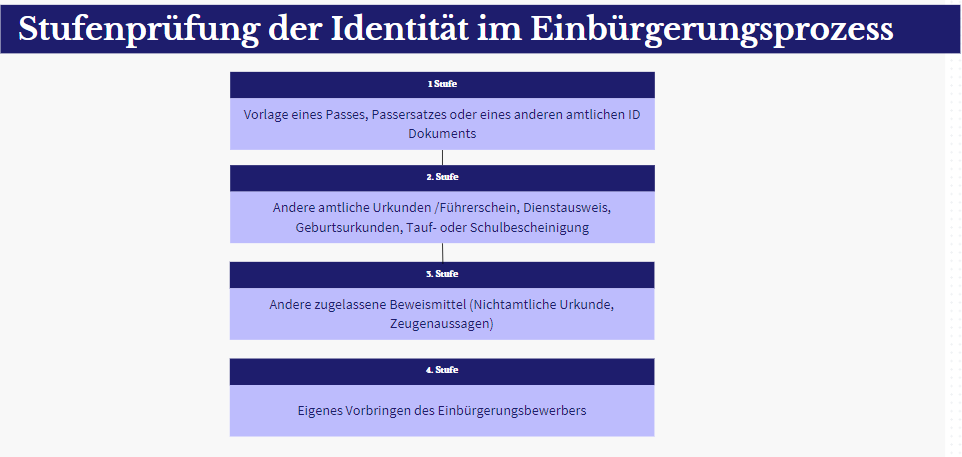Higher Administrative Court of Berlin-Brandenburg, March 19, 2012, Case No. OVG 3 B 15.11
To enter Germany, an individual must prove their identity if there are doubts. This requirement is outlined in § 5 of the Residence Act (AufenthG). The aim is to prevent individuals from operating under multiple identities. Typically, passports and ID cards serve as proof of identity. However, birth certificates and other official documents can also be used. Since such documents are issued differently in each country, German authorities scrutinize the submitted documents for their evidentiary value and credibility.

The following ruling from the Higher Administrative Court of Berlin-Brandenburg (OVG Berlin-Brandenburg) clarifies that the key elements for proving identity are the name, date of birth, and place of birth, and that there should be no discrepancies in these details.
Introduction: Legal Framework for Identity Verification
The judgement of the Higher Administrative Court of Berlin-Brandenburg deals with the question of the extent to which contradictory information regarding the identity of a visa applicant can justify a visa refusal. At the centre of the proceedings is the identity check, which is mandatory for the issue of a visa in accordance with Section 5 (1) No. 1a of the Residence Act (AufenthG). The court makes it clear that the complete and consistent clarification of the applicant's identity, in particular by providing information on name, date and place of birth, is of central importance. The case is an example of the problems that can arise when checking identity details if these are not supported by clear documents.
Case Background: Dispute Over Visa Issuance
In the case at hand, a Ghanaian citizen applied for a visa to travel to Germany in several attempts. Family reunification in Germany. She had already applied for asylum in Germany in 2003, but was unable to present any identification documents and gave contradictory information about her identity. After her asylum application was rejected, she returned to Ghana. In 2004, she again applied for a visa, this time for family reunification, and submitted a copy of the Ghanaian birth register. This application was also rejected as the German embassy in Accra considered the woman's marriage to be a sham. A further application in 2007 led to more intensive enquiries by the embassy, which brought to light numerous contradictions in the woman's statements, particularly regarding her name, place of birth and the schools she attended. Despite the submission of new documents, which in turn contained different information, the German embassy stood by its refusal.
The Lawsuit and First Instance Judgment
Following the rejection of her visa application, the woman sued in the administrative court. The court ruled in her favor, determining that her identity was sufficiently clarified. It argued that uncertainties about her name and discrepancies in the documents were not decisive. The court noted that the woman had agreed to registration in the foreigners‘ database, which would prevent future confusion. It also reasoned that deficiencies in the Ghanaian civil registry should not be held against her. Based on this, the court awarded her the visa.
Appeal Proceedings: Decision of the Higher Administrative Court
The German embassy appealed the decision, arguing that the woman’s identity remained unclarified. The Higher Administrative Court of Berlin-Brandenburg upheld the appeal and overturned the first instance ruling. It found that the woman’s identity was still not definitively clarified and thus did not meet the fundamental requirement for visa issuance under § 5 Abs. 1 Nr. 1a AufenthG. The court emphasized that identity verification must eliminate any risk of confusion. Specifically, contradictions in her name, date of birth, and place of birth raised doubts about the authenticity of the woman’s identity.
Significance of Identity Verification
The Higher Administrative Court underscored that identity verification is a central element in visa issuance. The identity must be clear and unambiguous to avoid any confusion. Contradictory information, such as that presented by the applicant, is unacceptable. The various versions of her birth certificates, the inconsistent details about the schools she attended, and the implausible name changes led to justified doubts about her identity. These doubts prevented a positive decision on the visa application.
Conclusion: Implications of the Ruling
The ruling of the Higher Administrative Court of Berlin-Brandenburg highlights the stringent requirements for identity verification in visa applications. It demonstrates that even minor inconsistencies in name, date of birth, or place of birth can lead to the rejection of an application if they cast doubt on the authenticity of the identity. The case also emphasizes the importance of presenting consistent and clear documents when applying for a visa. Discrepancies, as seen in this case, can undermine the credibility of the applicant and ultimately lead to the denial of the application. The ruling thus has significant implications for visa issuance practices and the standards for identity verification.
Source: Berlin-Brandenburg Higher Administrative Court
Important Note: The content of this article has been prepared to the best of our knowledge and belief. However, due to the complexity and constant evolution of the subject matter, we must exclude liability and warranty. Important Notice: The content of this article has been created to the best of our knowledge and understanding. However, due to the complexity and constant changes in the subject matter, we must exclude any liability and warranty.
If you need legal advice, please feel free to call us at 0221 - 80187670 or send us an email at or send an email to info@mth-partner.de info@mth-partner.de


